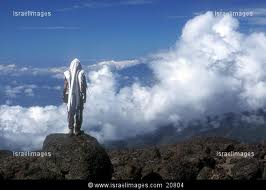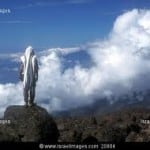Hashem places before us a momentous goal,” After Hashem your G-d shall you walk, and Him shall you fear, and His commandments shall you keep, and unto His voice shall you hearken, and Him shall you serve, and unto Him shall you cleave. ( Deuteronomy 13:5) . That “Cleaving(Dveikut) is the ultimate goal. How is it achieved? Is the keeping of the commandments ,listening to His voice and serving Him all that is necessary to achieve this elevated level of “Cleaving-Dveikut ?
On the eighth day upon the inauguration of the tabernacle Aaron, Moshe and the people of Israel awaited the revelation of G-d’s glory over the tabernacle. The first words of our parsha (Torah portion) hint at the trepidation and insecurity that surrounds that waiting.
“And it came to pass (VaYehi) on the eighth day.” (9:1)
Traditionally the word “VaYehi ( and it came to pass) ” is an eternal Torah sign of impending danger and concern. We saw the use of this code word as an introduction to a time of danger and threats in the Scroll of Esther:
“Now it came to pass (VaYehi) in the days of Ahashverush.” (Esther 1:1)
Why , then, would the inauguration of the tabernacle and the filling of that tabernacle with the Clouds of Glory be connected with concern and woe? The Netivot HaShalom offers a fascinating insight into the minds and hearts of the Israelite people during these momentous moments.
Here, were a people waiting for the inauguration of the Tabernacle under a cloud of worry and concern. This concern was focused on the question of whether or not Hashem truly forgave them for the sin of the calf. That burden of concern weighed heavily on Aaron as well.
We read that Moshe gathers the people to do what they had been preparing to do for the last seven days.He instructs the people to begin the sacrificial system and then declares to them the following;
“And they took what Moshe had commanded, to the front of the Tent of Meeting, and the entire community approached and stood before Hashem. And Moshe said, “This is the thing Hashem has commanded; do [it], and the glory of Hashem will appear to you.” ( Leviticus 9:5-6)
Yet at this point he turns to Aaron and says ;
“Approach the altar and perform your sin offering and your burnt offering, atoning for yourself and for the people, and perform the people’s sacrifice, atoning for them, as Hashem has commanded.” (ibid 9:7)
Why did Moshe have to tell Aaron to “approach the altar”? This is what he has been practicing for seven days. He knew what he had to do. Rashi teaches that Moshe had to order Aaron to do so, because Aaron was afraid to approach the altar. Moshe had to say to him “Why are you ashamed? It is for this role you have been chosen!” (Torath Kohanim 9:7)
Aaron then does what he was trained to do and then he turns to the people;
“And Aaron lifted up his hands towards the people and blessed them.”( ibid;22)
That blessing was pregnant with anticipation and yearning for the Kavod Hashem to appear.
Yet we read immediately the following” He then descended from preparing the sin offering, the burnt offering, and the peace offering.”
Rashi says the following “When Aaron saw that all the sacrifices had been offered and all the procedures had been performed, and yet the Kavod Hashem ( the Glory of G-d) had not descended for Israel, he was distressed. He said, “I know that the Holy One, blessed is He, is angry with me, and on my account Kavod Hashem has not descended for Israel.”
We then read the following;
“And Moshe and Aaron went into the Tent of Meeting. ( ibid :23)
We don’t know for how long they went into the tent for and we are not told what they did there but we then read,
“Then they came out and blessed the people, and the Glory of Hashem appeared to all the people.” (ibid 9:23)
Rashi suggests that in the tent of meeting they prayed for mercy.
(Torath Kohanim 9:16).After all the ritual and procedure, Aaron had brought to Hashem the ultimate sacrifice, Teshuva.
“For You do not wish a sacrifice, or I should give it; You do not desire a burnt offering. The sacrifices of G-d are a broken spirit; O G-d, You will not despise a broken and crushed heart.” (Psalm 51:18-19)
Why would that be so of the broken heart? To understand this one must clarify what Kavod Hashem –the Glory of G-d actually means. In common parlance it is usually seen as being synonymous with the concept of the Shechina -Presence of G-d . Yet that cannot be.
Ezekiel describes the Glory of G-d leaving the temple mount when the people of Israel go into exile.” ..the cherubim lift up their wings, and the wheels were beside them; and the Glory of the G-d of Israel was over them above. And the Glory of Hashem went up from the midst of the city, and stood upon the mountain which is on the east side of the city.(11:22-23) .
Many have mistranslated the word Kavod (Glory) as the ” Presence of G-d” . Yet that cannot be, as G-d’s Presence is never to leave the temple mount. “…whereof Hashem had said, In Jerusalem shall My name be for ever. (II Chronicles 33:4).Yet with the exile of His people, His Glory left as well.
Glory then, is best defined as the perceived Presence of G-d that necessitates people to declare His Glory or Kavod. That is to say Kavod or Glory necessitates a people who can become a worthy and active vessel
The awesome and frightening silence that followed to conclusion of Aaron’s Dedication ritual was devastating. It broke the hearts of the people and of Aaron. It was that broken and yearning heart that then brought about the revelation of G-d’s glory.
This experience of breaking, yearning and awareness becomes the critical ingredients ,then , of personal and corporate Dveikut ( cleaving) . May we all succeed in becoming the appropriate vessels.
LeRefuat Yehudit Bat Golda Yocheved

